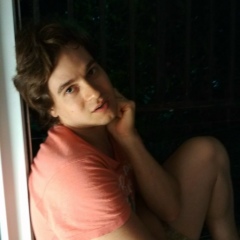После того, как немецкая сборная по футболу стала чемпионом мира, я спросила у мужа, гордится ли он теперь своей страной. Он сказал, что победа команды – это победа отдельных спортсменов и что им надо быть благодарным за их труд. Я спросила, рад ли он победе. Он сказал, что очень рад. Я спросила, рад ли он за страну. Он сказал, что рад и улыбнулся своей обоятельной широкой улыбкой. И в его восхищении и радости был патриотизм.
Я горжусь победой Германии, хоть я и не немка и хоть я и ничего не понимаю в футболе. Находясь здесь, видя небольшие немецкие флаги на больших домах, видя, как люди в полной тишине сидят вечерами в кафе и наблюдают Игру, а потом немного холодно-северно для чужого глаза, но горячо-эмоционально для прожившего здесь долго иностранца, от души обнимают друг друга и поздравляют с победой, видя и читая через что прошли спортсмены, какие неприятности они испытали, воспринимаешь все немного по-другому, чем в России. Я помню, что в России я очень не любила Нойера, он был для меня символом настоящего «арийца» времен Второй мировой. А здесь, послушав интервью с ним на немецком, и его очень тонкий анализ всей игры и описание ошибок даже после победного матча и услышав комментарии мужа о том, что Нойер настоящий «человек-магнит», мне Нойер понравился.
За пять часов до начала матча дедушка моего мужа, его папа и мама, его сестры и я горячо обсуждали патриотически-националистическую идею Германии. Семья разделилась на тех, кто считал и хотел, чтобы Германия победила, и на тех, кто был за проигрыш. Это была долгая дискуссия с представителями трех поколений и разных специальностей, и дедушка, участник войны, пленник французской армии, архитектор Гамбурга, строивший город после «Гоморры» с нуля, имел совсем другую точку зрения, чем мы все. Для него то, что для нас является историей и чем-то далеким, - жизнь.
А потом Германия выйграла матч, и Нойер целовался со своей девушкой, укутавшись немецким флагом, как одеялом. И не было Второй мировой, не было всех этих «политкорректностей», которым меня тут научили в Университете и которые я считаю перегибом. Не было всех этих чувств вины за прошлое у немцев. Была национальная гордость, тихая, скромная, без гитлеровских речей, и эта обоятельная улыбка мужа и сияние на его лице.
Мою семью затронула Вторая мировая война, как и многих из вас, тех, кто сейчас читает это. Я – ребенок из третьего поколения после Второй мировой, и для меня война, к счастью, это история. Я переехала на бывшую вражескую территорию, и мне тут здорово помогли совсем чужие люди, которые когда-то, может быть, даже воевали с моей семьей. Но, я считаю, что надо уметь прощать. Нужно уметь двигаться вперед, нужно развиваться и не останавливаться на месте, ибо жизнь – это только движение. Прощение – это движение. Переезд в другую страну – это движение. Нет слов «поражение» или «победа», не должно быть слов «война» или «враг», должно быть слово «прощение». И я говорю, привет, Германия. Мы победили. Ура!
Я горжусь победой Германии, хоть я и не немка и хоть я и ничего не понимаю в футболе. Находясь здесь, видя небольшие немецкие флаги на больших домах, видя, как люди в полной тишине сидят вечерами в кафе и наблюдают Игру, а потом немного холодно-северно для чужого глаза, но горячо-эмоционально для прожившего здесь долго иностранца, от души обнимают друг друга и поздравляют с победой, видя и читая через что прошли спортсмены, какие неприятности они испытали, воспринимаешь все немного по-другому, чем в России. Я помню, что в России я очень не любила Нойера, он был для меня символом настоящего «арийца» времен Второй мировой. А здесь, послушав интервью с ним на немецком, и его очень тонкий анализ всей игры и описание ошибок даже после победного матча и услышав комментарии мужа о том, что Нойер настоящий «человек-магнит», мне Нойер понравился.
За пять часов до начала матча дедушка моего мужа, его папа и мама, его сестры и я горячо обсуждали патриотически-националистическую идею Германии. Семья разделилась на тех, кто считал и хотел, чтобы Германия победила, и на тех, кто был за проигрыш. Это была долгая дискуссия с представителями трех поколений и разных специальностей, и дедушка, участник войны, пленник французской армии, архитектор Гамбурга, строивший город после «Гоморры» с нуля, имел совсем другую точку зрения, чем мы все. Для него то, что для нас является историей и чем-то далеким, - жизнь.
А потом Германия выйграла матч, и Нойер целовался со своей девушкой, укутавшись немецким флагом, как одеялом. И не было Второй мировой, не было всех этих «политкорректностей», которым меня тут научили в Университете и которые я считаю перегибом. Не было всех этих чувств вины за прошлое у немцев. Была национальная гордость, тихая, скромная, без гитлеровских речей, и эта обоятельная улыбка мужа и сияние на его лице.
Мою семью затронула Вторая мировая война, как и многих из вас, тех, кто сейчас читает это. Я – ребенок из третьего поколения после Второй мировой, и для меня война, к счастью, это история. Я переехала на бывшую вражескую территорию, и мне тут здорово помогли совсем чужие люди, которые когда-то, может быть, даже воевали с моей семьей. Но, я считаю, что надо уметь прощать. Нужно уметь двигаться вперед, нужно развиваться и не останавливаться на месте, ибо жизнь – это только движение. Прощение – это движение. Переезд в другую страну – это движение. Нет слов «поражение» или «победа», не должно быть слов «война» или «враг», должно быть слово «прощение». И я говорю, привет, Германия. Мы победили. Ура!
After the German national football team became a world champion, I asked my husband if he was proud of his country now. He said that the victory of the team is a victory of individual athletes and that they need to be grateful for their work. I asked if he was pleased with the victory. He said he was very happy. I asked if he was glad for the country. He said he was glad and smiled with his charming wide smile. And in his admiration and joy was patriotism.
I am proud of the victory of Germany, although I am not German and even though I do not understand anything in football. Being here, seeing small German flags on large houses, seeing people sitting in silence in the evenings in a cafe and watching the Game, and then a little cold-north for someone else's eyes, but hotly-emotional for a long-lived foreigner, heartily hug each other friend and congratulations on the victory, seeing and reading what the athletes went through, what troubles they have experienced, you perceive everything a bit differently than in Russia. I remember that in Russia I didn’t like Neuer very much, he was for me a symbol of the real “Aryan” of the Second World War. And here, after listening to an interview with him in German, and his very subtle analysis of the whole game and a description of mistakes even after the winning match and hearing the comments from her husband that Neuer is a real “man-magnet”, I liked Neuer.
Five hours before the match, the grandfather of my husband, his father and mother, his sisters and I hotly discussed the patriotic-nationalist idea of Germany. The family was divided into those who believed and wanted Germany to win, and those who were for the loss. It was a long discussion with representatives of three generations and various specialties, and the grandfather, a war veteran, a prisoner of the French army, the architect of Hamburg, who built the city after Gomorrah from scratch, had a completely different point of view than all of us. For him, what is history and something distant for us is life.
And then Germany won the match, and Neuer kissed his girlfriend, wrapped in a German flag, like a blanket. And there was no Second World War, there were not all these “political correctness” that I was taught here at the University and which I consider an exaggeration. It was not all these feelings of guilt for the past among the Germans. There was national pride, quiet, modest, without Hitler's speeches, and this charming smile of her husband and the radiance on his face.
My family was affected by World War II, like many of you who are reading this now. I am a child from the third generation after World War II, and for me, war, fortunately, is a story. I moved to the former enemy territory, and absolutely strangers who once, maybe, even fought with my family, helped me a lot. But, I consider that it is necessary to be able to forgive. You need to be able to move forward, you need to develop and not stop at the place, because life is only movement. Forgiveness is movement. Moving to another country is a movement. There is no words "defeat" or "victory", there should not be the words "war" or "enemy", there should be the word "forgiveness". And I say hello, Germany. We won. Hooray!
I am proud of the victory of Germany, although I am not German and even though I do not understand anything in football. Being here, seeing small German flags on large houses, seeing people sitting in silence in the evenings in a cafe and watching the Game, and then a little cold-north for someone else's eyes, but hotly-emotional for a long-lived foreigner, heartily hug each other friend and congratulations on the victory, seeing and reading what the athletes went through, what troubles they have experienced, you perceive everything a bit differently than in Russia. I remember that in Russia I didn’t like Neuer very much, he was for me a symbol of the real “Aryan” of the Second World War. And here, after listening to an interview with him in German, and his very subtle analysis of the whole game and a description of mistakes even after the winning match and hearing the comments from her husband that Neuer is a real “man-magnet”, I liked Neuer.
Five hours before the match, the grandfather of my husband, his father and mother, his sisters and I hotly discussed the patriotic-nationalist idea of Germany. The family was divided into those who believed and wanted Germany to win, and those who were for the loss. It was a long discussion with representatives of three generations and various specialties, and the grandfather, a war veteran, a prisoner of the French army, the architect of Hamburg, who built the city after Gomorrah from scratch, had a completely different point of view than all of us. For him, what is history and something distant for us is life.
And then Germany won the match, and Neuer kissed his girlfriend, wrapped in a German flag, like a blanket. And there was no Second World War, there were not all these “political correctness” that I was taught here at the University and which I consider an exaggeration. It was not all these feelings of guilt for the past among the Germans. There was national pride, quiet, modest, without Hitler's speeches, and this charming smile of her husband and the radiance on his face.
My family was affected by World War II, like many of you who are reading this now. I am a child from the third generation after World War II, and for me, war, fortunately, is a story. I moved to the former enemy territory, and absolutely strangers who once, maybe, even fought with my family, helped me a lot. But, I consider that it is necessary to be able to forgive. You need to be able to move forward, you need to develop and not stop at the place, because life is only movement. Forgiveness is movement. Moving to another country is a movement. There is no words "defeat" or "victory", there should not be the words "war" or "enemy", there should be the word "forgiveness". And I say hello, Germany. We won. Hooray!
У записи 3 лайков,
0 репостов.
0 репостов.
Эту запись оставил(а) на своей стене Наталья Кролл






















